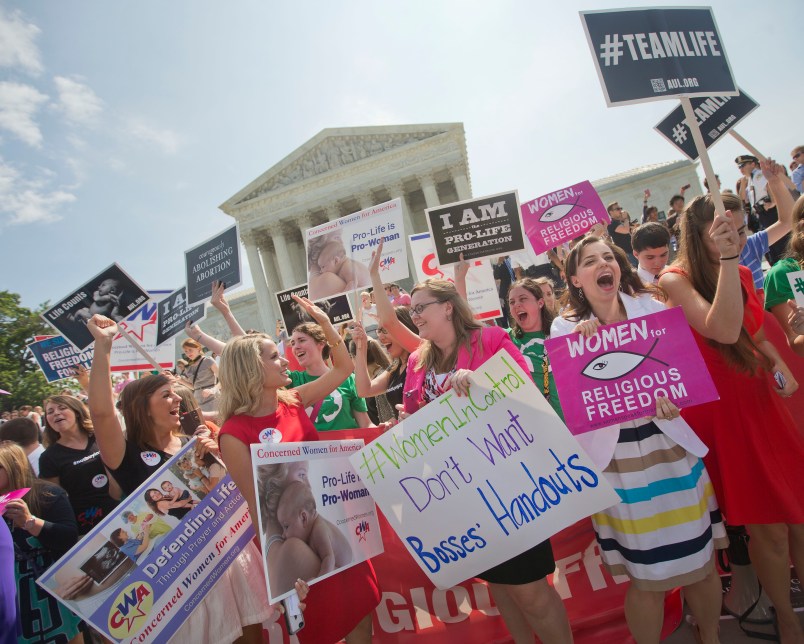The Supreme Court said in a landmark ruling on Monday that “closely held” corporations with religious owners may opt out of Obamacare’s birth control mandate, a definition that sounds narrow in scope but actually comprises a vast majority of American businesses.
The most immediate impact will be felt by the female employees of Hobby Lobby (which employs 13,000 people total) and Conestoga Wood (which employs 1,000 people), who will no longer have cost-free access to emergency contraceptives like the morning-after pill. Beyond that, health care experts and pro-choice advocates say it’s close to impossible to know precisely how many women will be affected because it depends on which employers opt out.
What’s clear is the ruling opens a door for all closely held corporations to seek relief from the birth control mandate, legal experts say. The statistics, though spotty on how many would be eligible to do so, suggest that could end up impacting millions of Americans.
“Most American businesses are closely held corporations so that’s not a significant restriction on the scope of its ruling. Some people are saying the ruling doesn’t go so far because it only applies to closely held corporations. But that’s the vast majority of corporations in America,” said Adam Winkler, a professor at UCLA School of Law.
The Supreme Court didn’t define “closely held,” but legal experts say businesses will look to the IRS, which says a closely held corporation as one in which 50 percent of the value of its outstanding stock is owned by five or fewer individuals.
So how many of those are there in America? A 2000 study estimated that more than 90 percent of American businesses are closely held, a number that could be different today, but it’s hard to say by how much. Another study, one conducted by Columbia University in 2009, found that closely held corporations employ about 52 percent of the U.S. labor force. That’s over 75 million Americans; the labor force has more than 150 million workers, according to the World Bank.
In her dissent, Justice Ruth Bader Ginsburg insisted that the ruling was much broader than the conservative justices were willing to admit. She torched it as “a decision of startling breadth” which paves the way for corporations, partnerships and sole proprietorships to “opt out of any law (saving only tax laws) they judge incompatible with their sincerely held religious beliefs.”
Ginsburg linked to a Forbes list of large private companies that she said could seek exemptions from laws due to the Court’s ruling, including Cargill, Koch Industries and Dell, which together employ more than 300,000 Americans.
Justice Samuel Alito, writing for the 5-4 majority, said the ruling is limited to the forms of birth control challenged in the case, noting that it doesn’t “necessarily” let religious business owners refuse to cover vaccinations or blood transfusions. But the Court opened the door to such lawsuits by ruling, for the first time, that for-profit corporations are persons who can practice religion for the purposes of the 1993 Religious Freedom Restoration Act, which imposes strict scrutiny standards for laws that substantially burden religious practices.
“The case is important because it is the first time in history that the Court has said that a for-profit company can claim to have religious beliefs and an exemption from a law,” said Erwin Chemerinsky, the Dean of UC Irvine School of Law. “In that way, I think it will open the door to challenges by close corporations — and other businesses — to laws of all sorts.”







The stunning stupidity of the 5 radicals on the court is truly breathtaking. But a continued march to proclaim business owners have more rights than actual people.
Corporations have no religious rights under the 1st Amendment. But then again, it’s the same crazy shits that determined that corporations have political speech rights.
Not according to the five radicals currently polluting the SCOTUS.
This article leaves out an important aspect of this asinine decision. The closely held company must also have been known to be a very religious organization. For instance, I would think this would apply to Chick Fil-A but not Dell.
Disastrous ruling.
Aside from the clear human cost this will impose on female employees of companies like Hobby Lobby, I have to wonder: what will be the cost of shepherding each and every thing that a “closely held corporation” now believes it has a religious right to enforce on its employees through the federal legal system?